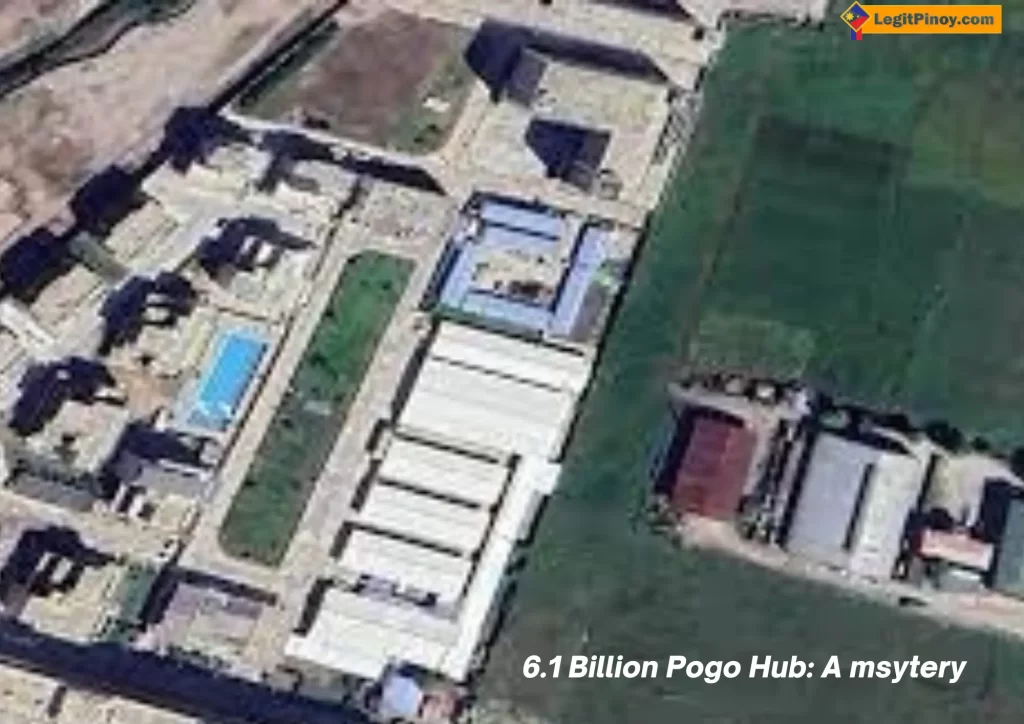P6.1 Billion for Bamban POGO Untraceable | Major Concern


Advertisement


The Mystery of Bamban’s Untraceable P6.1 Billion
A perplexing mystery has recently rocked Bamban’s financial landscape. A staggering P6.1 billion allocated for the city’s POGO operations has become untraceable, raising concerns and sparking widespread debate. This article delves into the intricacies of this financial enigma, exploring the implications for Bamban under Mayor Alice Guo’s leadership and the broader economic landscape.
Table of Contents
Mayor Alice Guo’s Leadership and the POGO Funding Enigma
Mayor Alice Guo, a dynamic leader known for her progressive policies, now faces one of her administration’s most challenging crises. The untraceable P6.1 billion earmarked for the Philippine Offshore Gaming Operators (POGO) sector in Bamban has put her governance under intense scrutiny. The mayor’s commitment to transparency and development is being examined as the search for the missing funds intensifies.
Uncovering the Financial Mystery: How P6.1 Billion Went Missing
The disappearance of P6.1 billion is not just a matter of lost money but a significant blow to Bamban’s financial integrity. Initial investigations have revealed that the funds, intended to boost the local economy through POGO investments, have vanished without a trace. Financial records, bank transactions, and audit trails have all failed to provide leads, deepening the mystery.
Government’s Struggle: Why the Source of P6.1 Billion Remains Unknown
The government’s inability to trace the source of the P6.1 billion is a critical issue. This situation highlights potential flaws in financial oversight and regulatory frameworks. The lack of concrete evidence or leads has hampered efforts to locate the funds, raising questions about the effectiveness of current financial monitoring systems.
The Role of POGO in Bamban’s Economic Landscape
POGO operations have significantly contributed to Bamban’s economy, providing jobs and stimulating local businesses. The untraceable funds threaten this economic pillar, potentially destabilizing the progress made in recent years. Understanding the pivotal role of POGO in Bamban’s development underscores the urgency of resolving this financial crisis.
Implications of Untraceable Funds on Bamban’s Development
The missing P6.1 billion has far-reaching ramifications. Beyond the immediate financial loss, there are concerns about investor confidence, public trust, and future economic planning. The city’s developmental projects and social programs could need to be improved, affecting the overall quality of life for Bamban residents.
Investigative Measures: Steps Taken to Track the Missing P6.1 Billion
In response to the crisis, the government has launched comprehensive investigative measures. Task forces involving financial experts, auditors, and law enforcement agencies have been established. Despite these efforts, the trail has gone cold, necessitating more innovative and stringent approaches to uncover the truth behind the missing funds.
Public Reactions: Bamban Residents Speak Out on the Financial Mystery
The untraceable P6.1 billion has not gone unnoticed by the public. Bamban residents have voiced their concerns, frustrations, and demands for accountability. Community forums and public hearings have been organized, empowering citizens with a platform to voice their opinions. And seek transparency from their leaders.
Comparative Analysis: Similar Cases of Untraceable Government Funds
Bamban’s financial dilemma is not an isolated case. History is replete with untraceable government funds, both locally and globally. By examining similar cases, we can identify common patterns, potential solutions, and preventive measures to avert such occurrences in the future.
Sponsored by:


A Comparative Analysis
To better understand Bamban’s current financial dilemma, it is essential to examine similar cases where government funds have gone untraceable. Analyzing these cases allows us to uncover patterns, viable solutions, and preventive actions. One noteworthy case in the Philippines that mimics the Bamban issue is the “PDAF Scam,” also known as the “Pork Barrel Scam.”
The PDAF Scam: A Case Study
Overview The Priority Development Assistance Fund (PDAF) scam, which came to light in 2013, involved the misuse and misallocation of government funds intended for developmental projects. The scam implicated several high-profile politicians and led to significant public outcry and legal proceedings.
Details of the Scam
- Funds Involved: The scam involved billions of pesos, similar in scale to the untraceable P6.1 billion in Bamban. Estimates suggest that up to P10 billion was diverted over a decade.
- Modus Operandi: Funds allocated under the PDAF were diverted to bogus non-governmental organizations (NGOs) that existed only on paper. These NGOs were purportedly created to implement development projects but, in reality, the funds were siphoned off by corrupt officials and their cohorts.
- Key Figures: Prominent political figures, including senators and representatives, were implicated. Janet Lim-Napoles, a businesswoman, was identified as the mastermind behind the creation of fake NGOs.
- Impact: The scam significantly undermined public trust in government institutions. It highlighted the need for robust financial oversight and stringent auditing mechanisms.
Investigative Measures and Outcomes
- Whistleblowers: The scam was exposed by whistleblowers who provided detailed accounts of the fraudulent activities.
- Legal Actions: Numerous cases were filed against the implicated individuals, leading to convictions and ongoing trials. The legal process continues to hold those responsible accountable.
- Reforms Implemented: In response to the scam, the government introduced several reforms to prevent similar occurrences. These included stricter auditing processes, transparency measures, and the abolition of the PDAF.
Lessons Learned
- Strengthened Oversight: The PDAF scam underscored the importance of robust financial oversight and regular audits to detect and prevent misuse of funds.
- Transparency and Accountability: Ensuring transparency in the allocation and utilization of public funds is crucial. Public access to information can deter fraudulent activities.
- Role of Whistleblowers: Protecting and encouraging whistleblowers can play a vital role in uncovering corruption and financial mismanagement.
The PDAF scam serves as a concrete example of how government funds can be misappropriated and the importance of strong governance mechanisms to prevent such incidents. By learning from past cases, Bamban’s administration can implement measures to ensure that the untraceable P6.1 billion is accounted for and that future financial mismanagement is prevented. Robust auditing, transparency, and accountability are essential to restoring public trust and maintaining the integrity of financial systems.
Conclusion: The Future of Bamban Amid Financial Uncertainty
As Bamban grapples with this financial mystery, the future remains uncertain. Mayor Alice Guo and her administration are under immense pressure to resolve the crisis and restore public confidence. The resolution of this case will be pivotal in determining Bamban’s economic trajectory and the effectiveness of its governance.
Final Thoughts
The untraceable P6.1 billion for Bamban’s POGO operations represents a significant challenge for the city. It underscores the need for robust financial oversight, transparency, and accountability in public administration. As investigations continue, the hope remains that the truth will emerge, ensuring a stable and prosperous future for Bamban.
Acknowledgements
We extend our gratitude to the following individuals and organizations for their contributions to this article:
- Mayor Alice Guo and her office for providing insights and updates on the ongoing investigations.
- The residents of Bamban for their candid feedback and engagement during public forums.
- Financial experts and auditors who have shared their professional opinions and analyses.
- Various news agencies and investigative journalists who have been diligently reporting on this issue.
References
- “Bamban’s POGO Dilemma: Untraceable Funds and Economic Impact,” Philippine Daily Inquirer.
- “The Missing Billions: A Deep Dive into Financial Oversight Failures,” Financial Times.
- “Public Reactions and Government Accountability in Bamban,” Manila Bulletin.
- “Historical Cases of Untraceable Government Funds,” Journal of Public Economics.
- Official statements and press releases from the Office of Mayor Alice Guo.
This comprehensive analysis aims to shed light on the complex issue of untraceable funds in Bamban and the broader implications for financial governance and economic stability.
You may also read the following:
- Wow888
- betso88
- bk8
- Majesty33
- Okebet168
- lodi291
- Phl63
- JiliCC
- jlbet
- phjoy
- phwin
- slotvip
- panalobet
- mnl63
- 10jili
- ok777 win
- jili22
- Lucky777 Casino
- lodigame
- Peso888
- intgames
- 22win
- milyon88
- ME777
- luckyjackpot888
- MNL777
- YY777
- SuperPH
- FC777
- JILIHOT
- Big Baller Club
- JILIPLAY
- MWPLAY888
- Playzone
- S5 Casino
- 684COM
- Terea Play
- GG777 Casino
- DBX
- PHLBet
You may also like:
Get Bonuses Here:

Jillian Cruz is a versatile blogger and content writer known for her curiosity and passion for writing about various topics. Her engaging writing style attracts readers from all backgrounds. She also collaborates with brands and publications, bringing her unique perspective to marketing campaigns and articles. With her creativity and dedication, Jillian continues to make an impact in the world of blogging and content creation.
